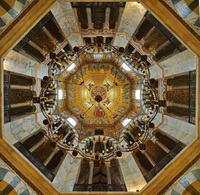Speaker
Description
The Baryon Antibaryon Symmetry Experiment (BASE-CERN) at CERN’s antiproton decelerator facility conducts high-precision comparisons of the fundamental properties of protons and antiprotons, such as their charge-to-mass ratios, magnetic moments and lifetimes. These experiments provide sensitive tests of charge-parity-time (CPT) invariance in the baryon sector. BASE was approved in 2013 and has since used single-particle multi-Penning-trap techniques to measure the antiproton-to-proton charge-to-mass ratio with a fractional precision of 69 p.p.t. [1]. The antiproton magnetic moment has been measured with a fractional precision of 0.8 p.p.m. [2] and subsequently at the level of 1.5 p.p.b. [3]. At our matter companion experiment BASE-Mainz, we have performed proton magnetic moment measurements with fractional uncertainties of 3.3 p.p.b. [4] and 0.3 p.p.b. [5]. By combining the data of both experiments we provide a baryon-magnetic-moment based CPT test $g_{\overline{p}}/g_p = 1.000 000 000 2(15)$, which improves the uncertainty of previous experiments by more than a factor of 3000 [6]. In this talk I will review the achievements of BASE, focusing on the antiproton-to-proton charge-to-mass ratio and magnetic moment measurements conducted at BASE-CERN.
[1] S. Ulmer et al., Nature 524, 196 (2015).
[2] H. Nagahama et al., Nat. Commun. 8, 14084 (2017).
[3] C. Smorra et al., Nature 550, 371 (2017).
[4] A. Mooser et al., Nature 509, 596 (2014).
[5] G. Schneider et al., Science 358, 1081 (2017).
[6] J. DiSciacca et al., Phys. Rev. Lett. 110, 130801 (2013).




